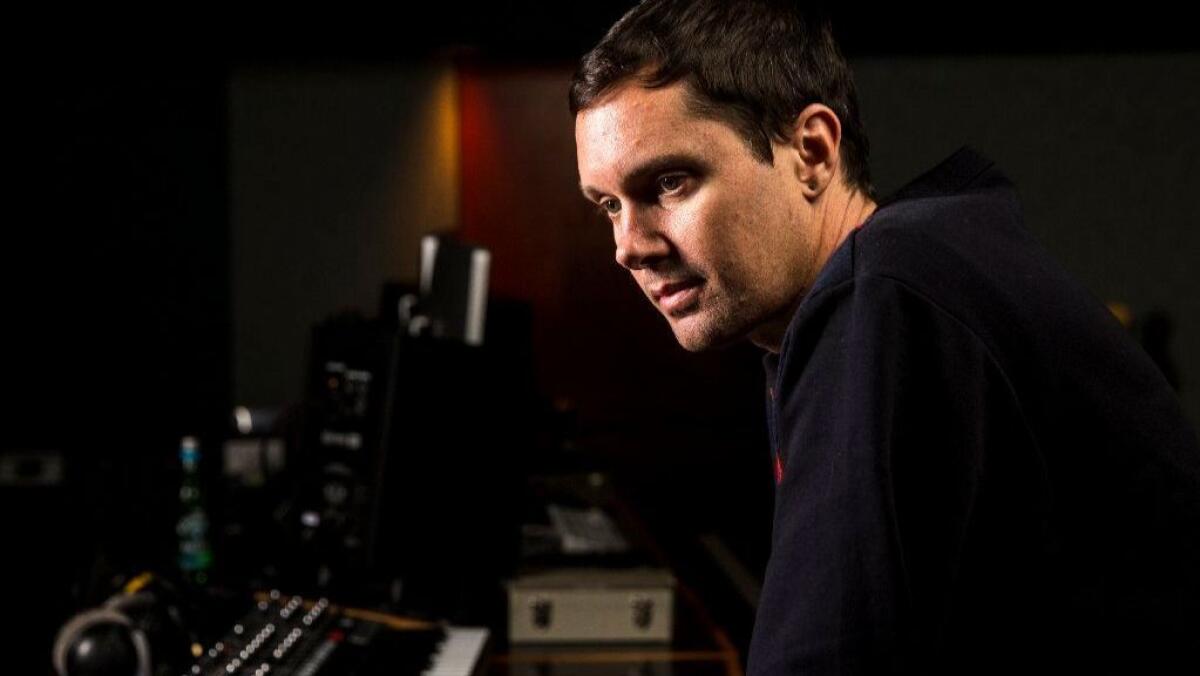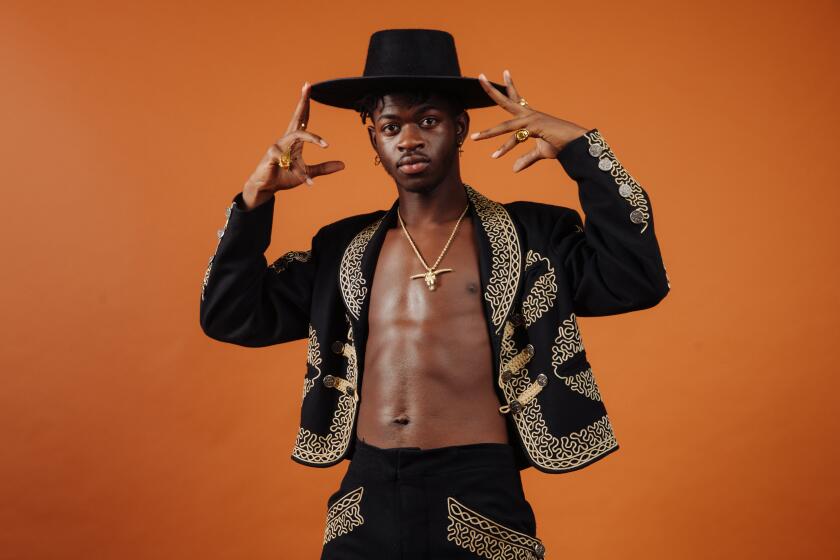With Rhye’s new ‘Blood,’ Mike Milosh is stepping out of the shadows

- Share via
“I’m gonna do this one kind of quiet,” Mike Milosh said, standing in a Westside rehearsal studio surrounded by the members of his sophisticated soul-funk band Rhye.
As the musicians eased into the relaxed groove of “Song for You,” Milosh murmured breathily about finding the courage to make oneself vulnerable to a lover. Eventually the tune picked up a bit of weight with Claire Courchene’s trombone and a beat that drummer Zach Morillo tapped out against his thighs; in response, Milosh sank slowly to his knees, as though he could restrain the music by making himself smaller.
A singer of uncommon delicacy and nuance, Rhye’s frontman and mastermind was doing what he could on a recent afternoon to protect his voice ahead of a lengthy tour behind “Blood,” the Los Angeles group’s stirring new album, which came out Friday.
“I don’t want to risk straining it,” he explained.
In truth, quiet isn’t a mere practicality for Milosh — it’s an aesthetic position.
Five years ago, the soft, refined sound of Rhye’s debut, “Woman,” made the act an instant sensation among fans and critics who compared the group to sensual R&B thinkers like Sade and Maxwell. Some of the attention came initially as a result of the mystery that Milosh and his former creative partner, producer Robin Hannibal, cultivated by keeping their faces hidden in photographs; many assumed the high-voiced Milosh was a woman.
Even after the picture cleared, though, Rhye continued to thrive, earning a nomination for the Polaris Music Prize and playing high-profile gigs at Coachella and Walt Disney Concert Hall.
Now the group, minus Hannibal, is back with its long-awaited follow-up.
“Blood” is slightly rougher around the edges than “Woman”; it’s less polished and precise, with more air in the arrangements. But the music is still strikingly tender. And in songs like “Please” and “Song for You,” Milosh is still tweaking slow-jam convention by presenting himself as a romantic supplicant — a man eager to be vanquished by love — rather than a sexual conqueror.
“My heart’s on the pavement where we’re building you and me,” he sings with something like ecstasy in “Please.”
What’s remarkable about the singer’s commitment to this style is that the time between albums might easily have coarsened his attitude. Milosh and his wife (to whom he dedicated “Woman”) divorced, and he went through a protracted dispute with his old record label. There was also his split from Hannibal, who went on to collaborate with artists such as Wet, Kimbra and L.A.’s Niia.
“A lot of hard things happened over the last few years,” Milosh, 42, said after the rehearsal, curled on a sofa in the studio’s dimly lighted control room. “But life is short. Why would you waste time sitting in trauma over something?”
Indeed, though “Blood” opens with a track in which the singer reflects on his divorce — it’s called “Waste” — the album soon moves on to explore the promise of new love. And not in a single-and-ready-to-mingle way. Milosh’s depiction of courtship, with its slow development of a shared universe, can feel refreshingly respectful in this age of countless news stories about callous and domineering men.
“Mike really cares about fragility, which there’s far too little of in basic ideas of masculinity,” said Thomas Bartlett, a songwriter and producer (also known as Doveman) who worked with Milosh on the new record. “It was a little bit of a mission to make that fragility central — to not be embarrassed by it.”
Which isn’t to say the music is prudish or effete. Milosh writes vividly about the physical sensations of sex, and “Blood’s” album cover shows his girlfriend’s naked body. Recently, the singer said, an online ad for the record was flagged by Facebook for nudity, which got him thinking about how the impulse to objectify is a learned behavior.
“Maybe I have a really naive perspective,” he admitted, “but I just thought it was a beautiful shot that embodied the intimacy of the record.”
Much of that intimacy comes from Milosh’s lyrics and from his vocals, which he records in whispery close-up. But “Blood” also has a sense of musicians playing together in a small room that distinguishes the album from the slicker, more digitally processed “Woman.”
In “Please,” for instance, Milosh proudly noted that you can hear the creak of Bartlett’s piano bench — something he and Hannibal would’ve been careful to remove from one of Rhye’s older songs.
The singer attributed that shift to the nearly 500 concerts Rhye played around the world after its debut came out. The live work, Milosh said, was in part a means of making money in order to buy back an option on Rhye’s second album. (Hannibal never performed onstage with the group, which is one reason he and Milosh drifted apart.)
In the studio this time Milosh was inspired to capture the peculiarities of a given moment: what happened when a certain group of players gathered in a certain place at a certain time. Beyond Bartlett, his collaborators included Nate Mercereau, known for his work with Kesha and Jay-Z, and King Henry, an L.A.-based producer with credits on songs by Beyoncé and Major Lazer; the album also features input from members of Rhye’s live band.
A lot of hard things happened over the last few years. But life is short. Why would you waste time sitting in trauma over something?
— Mike Milosh
Asked how he might define Rhye — as a group or a project or perhaps a concept — Milosh said he wouldn’t, really.
“I’m not married to any one identity of what it is,” he said, though his singing and lyrical sensibility definitely serve as a through-line.
So, too, does his face at this point. Thinking back to Rhye’s early days, Milosh insisted he wasn’t trying to be enigmatic. He’d had his feelings hurt when someone made fun of his nose in an online comment, so he decided not to put himself in the act’s photos.
But those five years of shows got him comfortable enough with being looked at that he appears in the music video for “Please.” (Rhye’s tour is scheduled to stop at the Orpheum Theatre on March 17.)
And at a moment when the influence of Rhye’s crafty yet tranquil sound can be detected in mainstream pop — listen to Calvin Harris’ “Slide” or “Ruin the Friendship” by Demi Lovato — Milosh says he’d be open to teaming with an established star if the right person were interested in trying out his style.
Especially if it helped fund his big dream, which is to buy a farm in Canada, where he grew up, and build his own secluded recording studio, far from the distractions and the noise of L.A. and New York.
“People could fly in for a month,” he said, “and just cook and hang out and go on wilderness hikes.”
And enjoy the limitless quiet.
Twitter: @mikaelwood
ALSO
Why Niia took a slow route to soul-music success
The Grammys were set for change, but that’s not what happened
Inara George on her stirring new album and the family tragedy that once defined her
More to Read
The biggest entertainment stories
Get our big stories about Hollywood, film, television, music, arts, culture and more right in your inbox as soon as they publish.
You may occasionally receive promotional content from the Los Angeles Times.











